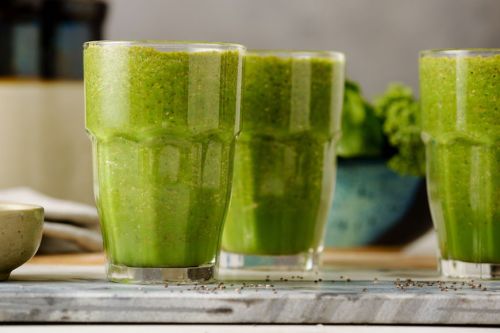Ah, green juice. Is there anything more emblematic of the wellness movement? The starring vegetable may change (spinach, kale, and now celery juice), but green juice in general has stood the test of time—unlike Jazzercise and Jane Fonda workout videos.
But are green juice benefits for real? It’s a question registered dietitian Tracy Lockwood Beckerman, RD gets to the bottom of in Well+Good’s latest episode of You Versus Food, a YouTube series devoted to giving the straight facts on popular food and drink trends. (You’ve already subscribed to our channel, right?)
What are the benefits of green juice?
There are a couple, Beckerman says. Namely:
1. It’s rich in antioxidants. Thanks to all of those fruits and vegetables, of course!
2. It’s filled with easy-to-absorb nutrients. OK, you know all the benefits that you’d generally get with green veggies (antioxidants, minerals and phytonutrients)? You can get most of them from a green juice, in a format that’s potentially easier for your body to digest.
3. It’s high in chlorophyll. Chlorophyll is what plants use to convert sunlight into energy—and gives them their signature green color. In people, chlorophyll can aid digestion, help detox the liver, and has antioxidant properties.
However: “A juice alone isn’t nutritionally considered a balanced meal,” Lockwood-Beckerman says. That’s because green juices typically lack much protein, healthy fat, and fiber. (Oh right, fiber!) She suggests supplementing a meal with green juice, or juicing between meals, rather than using a green juice as a meal replacement.
You should also be a little skeptical about people waxing poetic about celery juice. “More research is needed, specifically in humans, before we jump on the celery bandwagon,” says Beckerman. She says that certain compounds in celery (like tannins and saponins) have potential to help with a number of health conditions…but you can also just eat celery.
What should you look for in a green juice?
If you’re buying your green juice, keep your eye on the added sugar. “If it tastes too good to be true, it probably is,” Beckerman says. (Meaning there’s probably a ton of sugar in there!) If you see a label with fruit juice or fruit concentrate on the ingredients list, Beckerman says you should skip it.
It’s easier to control the sugar if you go the DIY route. “If making your own juice, you want a ratio of 2:1 when it comes to the perfect veggie to fruit ratio,” Beckerman says. “Say, two cups of spinach to one cup of berries.”
Ready to get your juice on? Watch the episode to the end to see if it gets the, er, green light from this top dietitian.
This piece was originally published on February 1, 2019. It was updated on April 5, 2019.
While we’re busting myths about food trends, let’s set the record about whether carb-y foods like potatoes and rice are good for you.
Sign Up for Our Daily Newsletter
Get all the latest in wellness, trends, food, fitness, beauty, and more delivered right to your inbox.
Got it, you've been added to our email list.










